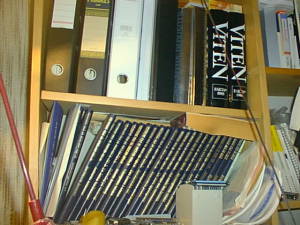Wednesday 21 November 2001

|
Pic of the day: If each thing were to be written down separately, I do not think the world would be large enough for all the books. (Snapshot from my bookshelf.) Too small headsMy "cosmic triplet" whose name varies (but whom I tend to think of as Arendel) said it so simply and truly a few days ago. (OK, 10 days ago.) "I consider what I've learned thus far in various subjects and realize how absolutely useless most of it is. standing alone. The science I know is so basic. I have so much more to learn before I can actually do anything with any of it." You'd think that, and I guess to some extent it is true, that you can actually do something when your education is finished. I know my best friend made similar comments while studying medicine. Now at the German universities where she studied, there was a lot of relevant practice, which she loved. But even so, much of what she read seemed hard to connect to the reality she met. It will probably always be. And frankly, I don't think it is possible to remember it all. Not even when lives depend on it. You have to approximate. You have to get an overview, and then try to apply the most relevant information in each case. Then look into the details when you meet them. But even after a full medical education, she will be facing a steep learning curve. And even when she is at the top (and she is the kind of person that will continue toward the top) she will realize that she can only hold a small fraction of the sum of knowledge in her field. Which is just one of many fields of applied science. Knowledge covers the Earth like water covers the bottom of the oceans. We are at best a cup. They say that the Devil is in the details, but surely God is even more so. It seems that all knowledge is of a fractal nature: As soon as you focus on some detail, it grows to reveal even more details. And so for most scientists - and practitioners of applied science as well - their career path is to dig themselves ever deeper into an ever smaller part of the whole. ***In contrast to this, a basic education should teach children to make sense of it all. It should provide a framework in which all things are connected, a skeleton of knowledge. A bit of basic “society survival skills” might not be a bad idea either, since it seems that not everyone gets this at home. In today's highly fragmented society, it is not a certainty that people feel that they know their place in the world, and how the knowledge they are fed fit in. I suppose I should count myself lucky, for I do indeed see the world of knowledge as a giant dome, unbroken in all directions (but hazy in parts). All parts fit seamlessly with other parts. This holds true also for such "sciences" as homeopathy and astrology. They fit very nicely in their respective corners of psychology. Remember, the body and the soul are inseparable as the coin and the imprint on the coin. Even theology is there; for our knowledge of God is not our knowledge of God, but our knowledge of our image of God. It can be debated and dissected logically; but the mystic experience is another matter entirely, and the two are often as not radically different. Humility comes at a rebate to us mystics. For we know that we are unable to know all there is to know. We know that we will not even ever know all that is humanly possible to know, each of us. And we know that even when we know, we do not really understand. For you cannot truly understand the parts without understanding the whole. And neither can you understand that which you yourself are just a small part of. Now you may say that all this is obvious and not mystic at all. I wish it were so. But it seems that saying the words is one thing; experiencing is another. Facing that which cannot be spoken, cannot be named, the all-encompassing ... it cannot help but change you at least a bit, I think. Regardless of that, I think I am not alone in wanting to know it all. But I have to accept that I cannot. That doesn't mean I stop trying. To search for knowledge is not really goal-oriented. It is an expression of being human. Foxes hunt, rabbits flee, snakes slither and humans seek knowledge and understanding. That's just the way we are. And as with other instincts (pardon the word), ignoring this drive will lead to a sense of unease and dissatisfaction, a feeling that something is missing. Even though we are bound to die and be forgotten, we still feel this deep need to learn while we live. It is no wonder people have always believed in an afterlife. For the direction of our life, such as it is steered by our deeper inner nature, is forward into eternity. As if we were here to learn, rather than just to spread our genes like other life forms. Whether this is indeed true, like some of us believe, or just an illusion – that shall be the last thing we never learn here. |
A bit rainy. |
Yesterday <-- This month --> Tomorrow?
One year ago
Two years ago
Three years ago